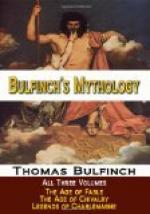OPHION, king of the Titans, who ruled Olympus till dethroned by the gods Saturn and Rhea
Ops See Rhea
Oracles, answers from the gods to questions from seekers for knowledge or advice for the future, usually in equivocal form, so as to fit any event, also places where such answers were given forth usually by a priest or priestess
Orc, a sea monster, foiled by Rogero when about to devour Angelica
Oreads, nymphs of mountains and hills
Orestes, son of Agamemnon and Clytemnestra, because of his crime in killing his mother, he was pursued by the Furies until purified by Minerva
Orion, youthful giant, loved by Diana, Constellation
ORITHYIA, a nymph, seized by Boreas
Orlando, a famous knight and nephew of Charlemagne
Ormuzd (Greek, Oromasdes), son of Supreme Being, source of good as his brother Ahriman (Arimanes) was of evil, in Persian or Zoroastrian religion
Orpheus, musician, son of Apollo and Calliope, See Eurydice
Osiris, the most beneficent of the Egyptian gods
Ossa, mountain of Thessaly
Ossian, Celtic poet of the second or third century
Ovid, Latin poet (See Metamorphoses)
Owain, knight at King Arthur’s court
OZANNA, a knight of Arthur
P
Pactolus, river whose sands were changed to gold by Midas
Paeon, a name for both Apollo and Aesculapius, gods of medicine,
Pagans, heathen
Paladins or peers, knights errant
Palaemon, son of Athamas and Ino
Palamedes, messenger sent to call Ulysses to the Trojan War
Palamedes, Saracen prince at Arthur’s court
Palatine, one of Rome’s Seven Hills
Pales, goddess presiding over cattle and pastures
PALINURUS, faithful steersman of Aeeas
Palladium, properly any image of Pallas Athene, but specially applied to an image at Troy, which was stolen by Ulysses and Diomedes
Pallas, son of Evander
Pallas A THE’NE (Minerva)
PAMPHA Gus, a dog of Diana
Pan, god of nature and the universe
Panathenaea, festival in honor of Pallas Athene (Minerva)
Pandean pipes, musical instrument of reeds, made by Pan in memory of Syrinx
Pandora (all gifted), first woman, dowered with gifts by every god, yet entrusted with a box she was cautioned not to open, but, curious, she opened it, and out flew all the ills of humanity, leaving behind only Hope, which remained
Pandrasus, a king in Greece, who persecuted Trojan exiles under Brutus, great grandson of Aeneas, until they fought, captured him, and, with his daughter Imogen as Brutus’ wife, emigrated to Albion (later called Britain)




